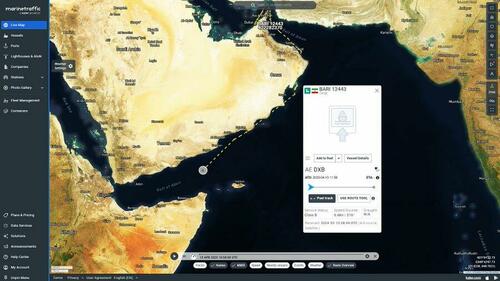
Attacks on Red Sea shipping from Yemen's Houthis have continued over the last several days, but so has the US coalition's response.
On Wednesday many large explosions rocked the Houthi-held port city of Hodeidah, the result of the latest major US and British strikes. The last three days have seen some 30 missile strikes on Yemen from the coalition Operation Prosperity Guardian.

Yemeni sources have said that in total the US and UK have carried out 403 attacks on the country, including 203 airstrikes, since Red Sea hostilities began in reaction to Israeli's offensive in Gaza.
A Houthi government spokesman this week announced the following claimed 'stats':
Shami added that Yemeni naval forces have carried out operations against 14 US vessels, three British vessels, and 17 Israeli vessels since the start of the Gaza–Israel war in October.
"We banned the entry of 99 American commodities, merchandise, and companies that support the criminal Zionist entity," Shami said.
"We shut down 354 agencies and 12 companies and 23 branches of companies … [linked to] American and Zionist trademarks," he continued.
But there are also fresh reports saying the Houthis are in many cases "firing blind" and even inadvertently targeting Iranian vessels. This means what Russian and Chinese ships could also come under fire, despite Houthis officials having declared they have been given safe passage.
One maritime report describes of the latest friendly fire incident:
On Monday, Yemen’s Houthi rebels fired ballistic missiles at a ship bound for Iran, the militia’s main supporter. Would the Houthis really target their patrons in Tehran?
Almost certainly not. There’s no evidence to suggest a rupture between Iran and the Houthis, who have been attacking ships in the Red Sea in hopes of increasing global pressure on Israel to stop its assault on Gaza.
Rather, according to Eurasia Group’s Iran Expert Gregory Brew, the attack shows that the Houthis may be simply taking a different tack. "Houthi attacks may become more indiscriminate," says Brew, "hitting ships they don’t intend to hit, or targeting ones with more sensitive cargoes."
On Thursday there has been another incident, east of Yemen's Aden, where a cargo vessel has suffered fresh damage - presumably from rocket or drone fire coming from Yemen.
British maritime security agency UKMTO has said in an alert that an explosion was reported near a ship traversing off Yemen's coast. The ship reported "an explosion in close proximity to the vessel" while sailing to its next port of call. However details have been scant and the exact nature of what happened is still unclear.
Yemen's Houthis have vowed to keep up their attacks on both foreign commercial vessels and Western warships in the Red Sea. Incidents have now become daily, and so have the US coalitions attacks, often against Houthi launch sites. But clearly the West's deterrent measures haven't worked.
Attacks on Red Sea shipping from Yemen’s Houthis have continued over the last several days, but so has the US coalition’s response.
On Wednesday many large explosions rocked the Houthi-held port city of Hodeidah, the result of the latest major US and British strikes. The last three days have seen some 30 missile strikes on Yemen from the coalition Operation Prosperity Guardian.

Yemeni sources have said that in total the US and UK have carried out 403 attacks on the country, including 203 airstrikes, since Red Sea hostilities began in reaction to Israeli’s offensive in Gaza.
A Houthi government spokesman this week announced the following claimed ‘stats’:
Shami added that Yemeni naval forces have carried out operations against 14 US vessels, three British vessels, and 17 Israeli vessels since the start of the Gaza–Israel war in October.
“We banned the entry of 99 American commodities, merchandise, and companies that support the criminal Zionist entity,” Shami said.
“We shut down 354 agencies and 12 companies and 23 branches of companies … [linked to] American and Zionist trademarks,” he continued.
But there are also fresh reports saying the Houthis are in many cases “firing blind” and even inadvertently targeting Iranian vessels. This means what Russian and Chinese ships could also come under fire, despite Houthis officials having declared they have been given safe passage.
One maritime report describes of the latest friendly fire incident:
On Monday, Yemen’s Houthi rebels fired ballistic missiles at a ship bound for Iran, the militia’s main supporter. Would the Houthis really target their patrons in Tehran?
Almost certainly not. There’s no evidence to suggest a rupture between Iran and the Houthis, who have been attacking ships in the Red Sea in hopes of increasing global pressure on Israel to stop its assault on Gaza.
Rather, according to Eurasia Group’s Iran Expert Gregory Brew, the attack shows that the Houthis may be simply taking a different tack. “Houthi attacks may become more indiscriminate,” says Brew, “hitting ships they don’t intend to hit, or targeting ones with more sensitive cargoes.”
On Thursday there has been another incident, east of Yemen’s Aden, where a cargo vessel has suffered fresh damage – presumably from rocket or drone fire coming from Yemen.
British maritime security agency UKMTO has said in an alert that an explosion was reported near a ship traversing off Yemen’s coast. The ship reported “an explosion in close proximity to the vessel” while sailing to its next port of call. However details have been scant and the exact nature of what happened is still unclear.
Yemen’s Houthis have vowed to keep up their attacks on both foreign commercial vessels and Western warships in the Red Sea. Incidents have now become daily, and so have the US coalitions attacks, often against Houthi launch sites. But clearly the West’s deterrent measures haven’t worked.
Loading…






